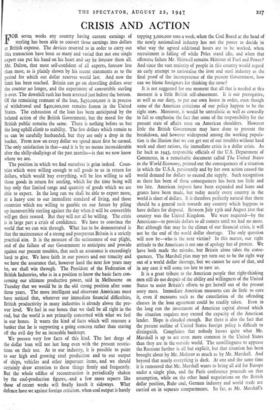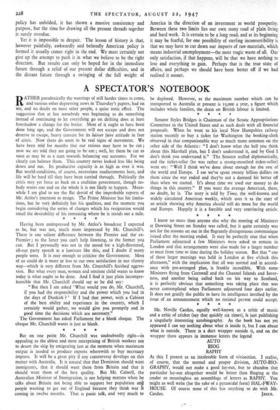CRISIS AND ACTION F OR seven weeks any country having current
earnings of sterling has been able to convert those earnings into dollars at British expense. The devices resorted to in order to carry out this transaction have been so many and varied that not one single expert can put his hand on his heart and say he foresaw them all. Mr. Dalton, that most self-confident of all experts, foresaw less than most, as is plainly shown by his recent statements as to the period for which our dollar reserves would last. And now the limit has been reached. Britain can go on shovelling dollars over the counter no longer, and the experiment of convertible sterling is over. The downhill rush has been arrested just before the bottom. Of the remaining remnant of the loan, $45o,000,000 is in process of withdrawal and $400,000,00o remains frozen in the United States. The exhaustion of the loan has been anticipated by the belated action of the British Government, but the moral for the British public remains the same. There is nothing before us but the long uphill climb to stability. The few dollars which remain to us can be carefully husbanded, but they are only a drop in the bucket. From now on every dollar we spend must first be earned. The only satisfaction in that—and it is by no means inconsiderable after the shilly-shallyings of the past months—is that we now know where we are.
The position in which we find ourselves is grim indeed. Coun- tries which were willing enough to sell goods to us in return for dollars, which would buy everything, will be less willing to sell those goods in return for sterling, which for the time being will buy only that limited range and quantity of goods which we are able to export. In the long run we shall be able to export more, at a heavy cost to our immediate standard of living, and those countries which are willing to gamble on our future by piling up inconvertible sterling against the day when it will be convertible will get their reward. But they will not all be willing. The crisis is in large part a crisis of confidence. We have to convince the world that we can win through. What has to be demonstrated is that the maintenance of a strong and prosperous Britain is a strictly practical aim. It is the measure of the seriousness of our plight, and of the failure of our Government to anticipate and provide against our present troubles, that such an assurance is exceedingly hard to give. We have faith in our powers and our tenacity and we have the assurance that, however hard the next few years may be, we shall win through. The President of the Federation of British Industries, who is in a position to know the basic facts con- cerning our ultimate productive power, said in Melbourne on Tuesday that we would be in the old strong position after some three years. The more intelligent and observant Americans must have noticed that, whatever our immediate financial difficulties, British productivity in many industries is already above the pre- war level. We feel in our bones that we shall be all right in the end, but the world is not primarily concerned with what we feel in our bones. It wants the kind of facts which will reassure a banker that he is supporting a going concern rather than staving off the evil day for an incurable bankrupt.
We possess very few facts of this kind. The last dregs of the dollar loan will not last long even with the present restric- tions on their use. As to our industry, it is possible to point to our high and growing steel production and to our output of ships, vehicles and other important items, and we should certainly draw attention to these things firmly and frequently.
But the whole edifice of reconstruction is periodically shaken by the coal-production figures, rand a few more reports like those of recent weeks will finally knock it sideways. What defence have we against foreign criticism, when coal output is barely topping 3,000,000 tons a week, when the Coal Board at the head of the newly nationalised industry has not the power to decide in what way the agreed additional hours are to be worked, when recruitment is falling off while Poles stand idle, and when that offensive failure Mr. Shinwell remains Minister of Fuel and Power? And since the vast majority of people in this country would regard an early attempt to nationalise the iron and steel industry as the final proof of the incompetence of the present Government, how can we blame foreigners for thinking the same?
It is not suggested for one moment that all that is needed at this moment is a little British self-abasement. It is our prerogative, as well as our duty, to put our own house in order, even though some of the American criticisms of our policy happen to be the right ones. Moreover, it would be unrealistic as well as cowardly to fail to emphasise the fact that some of the responsibility for the present state of affairs rests on American shoulders. However little the British Government may have done to prevent the breakdown, and however widespread among the working popula- tion is the illusion that we can get out of our troubles without hard work and short rations, the immediate crisis is a dollar crisis. As far back as 1943, responsible officials of the U.S. Department of Commerce, in a remarkable document called The United States in the World Economy, pointed out the consequences of a situation in which the U.S.A. persistently and by her own action caused the world demand for dollars to exceed the supply. Such recognition as there has been of those consequences has been too little and too late. American imports have been expanded and loans and grants have been made, but today nearly every country in the world is short of dollars. It is therefore perfectly natural that there should be a general rush towards any country which happens to have dollars for disposal. Between July i5th and August 21st that country was the United Kingdom. We were required—by the Americans—to provide dollars to all corners until we had no more. But although that may be the climax of our financial crisis, it will not be the end of the world dollar shortage. The only question will now be—who is the next victim? In this matter, our right attitude to the Americans is not one of apology but of protest. We have both made the mistake, but Britain alone takes the conse- quences. The Marshall plan may yet turn out to be the right way out of a world dollar shortage, but we cannot be sure of that, and in any case it will come too late to save us.
It is a great tribute to the American people that right-thinking men still do not despair of the ability and willingness of the United States to assist Britain's efforts to get herself out of the present sorry mess. Immediate American measures can do little to cure it, even if measures such as the cancellation of the offending clauses in the loan agreement could be readily taken. Even in the long run the investment of American capital abroad which the situation requires may exceed the capacity of the American lender. Hope is clouded enough. But there is also the fact that the present outline of United States foreign policy is difficult to distinguish. Complaints that nobody knows quite what Mr. Marshall is up to are even more common in the United States than they are in the outside world. The unwillingness to appease the Russians further is all but explicit, but that situation has been brought about by Mr. Molotov as much as by Mr. Marshall. And beyond that nearly everything is dark. At one and the same time it is rumoured that Mr. Marshall wants to bring all aid for Europe under a single plan, and the Paris conference proceeds on that assumption, while on the other hand negotiations on the British dollar position, Ruhr coal, German industry and world trade are carried on in separate compartments. So far, as Mr. Marshall's policy has unfolded, it has shown a massive consistency and purpose, but the time for drawing all the present threads together is surely overdue.
Yet it is impossible to despair. The lesson of history is that, however painfully, awkwardly and belatedly American policy is formed it usually comes right in the end. We must certainly not give up the attempt to push it in what we believe to be the right direction. But results can only be hoped for in the immediate future through a relief of our present dollar difficulties, and in the distant future through a swinging of the full weight of America in the direction of an investment in world prosperity. Between these two limits lies our own stony road of plain living and hard work. It is certain to be a long road, and at its beginning it may be fearful, for one possibility of sterling inconvertibility is that we may have to cut down our imports of raw materials, which means industrial unemployment—the most tragic waste of all. Our only satisfaction, if that happens, will be that we have nothing to lose and everything to gain. Perhaps that is the true state of affairs, and perhaps we should have been better off if we had realised it sooner.



































 Previous page
Previous page